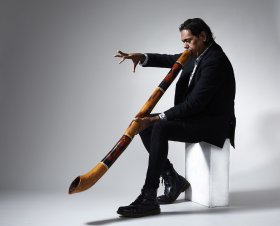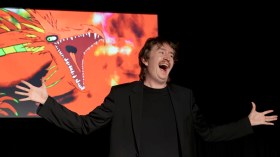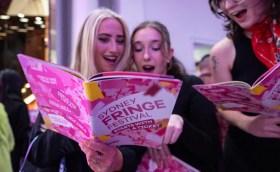The following review contains references to suicide.
Each year Edinburgh Festival Fringe teems with Australian content, and producer House of Oz generally showcases some of the most interesting. The organisation directed ArtsHub see its newest shows at this year’s Fringe, each one representing vastly different aspects of Australian life and culture. The State of Grace (about sex worker Grace Bellavue) explores underworld Australia, Dancefloor Conversion Therapy – queer Australia, Of The Land on Which We Meet – Black Australia and Summer of Harold – white Australia.
The State of Grace
★★★★ 1/2
The State of Grace, based on the writing of late sex worker Pippa Sullivan, aka Grace Bellavue, has been created and is performed by Michaela Burger, a multi award-winning cabaret artist from Adelaide. Burger was approached by Bellavue’s mother, who requested she tell her daughter’s story, and gave her a box full of Bellavue’s costumes, sex toys and, most importantly, writing on which Burger based her show.
Bellavue was an empowered, sex-positive prostitute and passionate advocate for sex workers. She delivered TED Talks on decriminalisation, wrote articles for major publications, and was open and honest on her social media about her involvement in her industry, attracting thousands of followers. Sadly, she took her own life at 27.
Burger created a series of beautiful songs based on Bellavue’s hip hop lyrics and writing. Often the lyrics play out on a screen behind her, enabling the audience to fully take in the quality of the writing, which is mostly very good. We learn that Bellavue was warm and compassionate, much loved by a wide friendship circle, funny, generous and kind, prone to giving everything in her purse to the homeless, or inviting them back to sleep on her couch.
She was also loved and gave love to her clients and saw her job as providing an important social service to her community. In the most moving section of the show, she talks of an experience with a client who broke down in utter grief over the loss of his partner two years prior. She offered him solace, and we see that Bellavue was not only a sex worker and writer, but also a counsellor, social worker and often sex educator.
Burger is warm and confident in the role, exuding grace, charm, humour and an inner beauty. She deftly captures all the complexities and intricacies of her character. Her songs are joyous and uplifting, and the entire show successfully challenges the common misconception that sex workers are damaged, degraded and often drug addicted.
Bellavue had a healthy attitude towards sex, loved her job and worked hard to re-educate the public about it. Interestingly, Burger has chosen to focus on Grace’s humanity and ebullience of spirit, rather than the reasons for her suicide. I would have been interested to know what was behind her untimely death – this could have brought a dimension of pathos to the show – however, I respected the positivity in Burger’s choice of story-telling and thoroughly enjoyed this uplifting examination of an unconventional life.
The State of Grace will be performed at the Assembly Rooms until 24 August 2024.
Dancefloor Conversion Therapy
★★★★★
Dancefloor Conversion Therapy by WA producer/performer Mikala Westall and actor/DJ extraordinaire Jonny Hawkins is an absolute hoot from start to finish. This is genre-defying performance, combining theatre and comedy with a dance party. It inspired such joy in the audience that we all stayed up dancing, laughing and having fun till the wee hours of the morning.
The play begins with Westall on the DJ decks. Kookaburras sing what Jonny later calls ‘the song of regret’ (as you make your way home from an awesome dance party, not regretting that you stayed up so late, but that the party is over). Then some beats kick in and Hawkins makes a grand entrance sporting a hilarious deconstructed Victorian dress and mullet, sings a catchy dance track about loving your body, gets the audience to strip off their dress to reveal a sexy blue garter outfit with KingGee shorts beneath and then cheekily announces that they used to be a Christian youth minister. The audience roars with laughter and doesn’t stop laughing for the next hour.
In an interview with Theatre Tonic, Hawkins said, ‘It’s a show about my own bunk philosophy of community, dance music, participation in ritual madness and joy.’
They take us on a hysterical journey through the etiquette of partying and outlines a number of archetypes that play out in the dance party scene. (Doof Butler makes the party sparkle, but they can turn into Doof Martyr – when they go too far, do too much and need to let everyone know what a hero they are.) Their performance is so fresh and natural it doesn’t appear scripted – it’s like you’ve just met at a party and they’re regaling you with stories from their life. Their considerable warmth and charisma instantly make them feel like a best friend, as they take you on a journey through their transformation from naïve homeschooled Christian minister to party freak extraordinaire.
Highlights are their explanation of the doof phenomenon in Australia. The word “doof”, they explain, came from a little old lady complaining to the police that the music went ‘doof doof doof’ all night and quickly caught on like wildfire, spawning a whole new genre of dance parties in Australia that usually occur at secret locations in warehouses and the bush. (Mikala cheekily adds the aside, ‘And you know what you get in the Aussie bush? Snakes! Aussie doofs are hardcore!’)
And the finale, where they get the audience to move their chairs to the side, blow their secret shame into a balloon, then toss the balloons in the air and dance with them while they spin some utterly contagious tunes, is Fringe gold.
The experience of watching Dancefloor Conversion Therapy is like being high as a kite at the best dance party ever with your best friends, having the time of your life. For this Gen Xer, who witnessed the birth of rave culture when I squatted in London in 1989, when acid house music hit the clubs, Ecstasy hit the streets and everyone wore smiley face bandanas, it was a joyous reminder of the healing power of dance, parties, friendship and hedonism.
Dancefloor Conversion Therapy will be performed at Underground Assembly George Square until 24 August 2024.
Of the Land on Which We Meet
★★★★
Of the Land on Which We Meet is powerful Indigenous circus theatre by Melbourne/Naarm-based Na Djinang Circus that explores acknowledgement, accountability and connection to Country. It features an Indigenous man (Jonathon Brown), a daughter of migrants (Manelaya Kados-Nitis) and a descendant of colonial settlers (Bridie Hooper), who interweave their stories with kinetic and emotional intensity. A full house on opening night was a sign that Edinburgh audiences are hungry for Indigenous stories; the circus also received a standing ovation at the end.
I was most drawn to Brown’s story and performance. He has a powerful physicality and strong presence, beneath which lies the vulnerability of the oppressed. He begins by telling a story of how he was taught as a child to regularly place his hands on the earth, close his eyes and take a moment to connect – and it shows. Throughout the show he appears deeply grounded and present, an embodied reminder to us all of the importance of staying connected to the earth beneath our feet.
The most potent moment in the show is when Brown talks about the Voice to Parliament referendum last year. He simply states the facts – that 61% of Australians did not believe Aboriginal Australia needed a Voice to Parliament. The deep pain implicit in this statement is embedded in the powerful movement that follows, as the performers twist and contort around each other in an evocation of rage and torment. It is an incredibly moving theatrical moment – made all the more potent by the fact that this story is being played out on an international stage. I felt deep shame at the way Australians will be judged and perceived internationally by the results of that referendum, and again questioned: why? How could we be so ignorant and blind?
The other potent moment is when Hooper tells the story of a cultural blunder the company made on a regional tour, when they mistakenly acknowledged the wrong mob at the start of the show. She explains there was a huge sensitivity in the area about whose land was whose, and much conflict over boundaries.
They then use acrobatics to tell the story of the pain and rejection they experienced as a result of that mistake. The physical storytelling of the shame, conflict and anguish over a cultural error is a powerful reminder of the pain Aboriginal Australians regularly experience over the lack of acknowledgement of their connection to land. The transparency and inherent integrity of the company in explaining its blunder and turning it into art is testimony to the healing power of truth-telling.
Of the Land on Which We Meet is a meta circus performance, a profound commentary on the importance of acknowledgement and connection to Country and a powerful call to truth-telling and accountability. It fully deserved its standing ovation on opening night and deserves to sell out the rest of its run.
Of the Land on Which We Meet will be performed at Assembly Checkpoint until 25 August 2024.
Summer of Harold
★★★★
Summer of Harold, written by accomplished playwright Hillary Bell, is a trio of three short plays performed by Lucia Mastrantone and Berynn Schwerdt and directed by Damien Ryan. This is a polished production that ticks all the boxes – superbly crafted writing, self-assured performances and confident direction.
In the first play, Summer of Harold (which I believe is autobiographical) Mastrantone plays Janet, who travels to London in her gap year with her best friend, the droll, chain-smoking Alison, and lands a job as housekeeper to none other than the self-proclaimed ‘greatest playwright of the 20th century’ Harold Pinter and his wife ‘Lady A’.
It’s a hilarious tale of Australian gaucheness up against upper class British refinement with some great Pinteresque jokes (‘He paused for a moment – two dots not three’) and is performed with aplomb by Mastrantone, who sends up the awkward teenagers with great comic timing and relish.
The second play Enfant Terrible takes a very funny look at masculine hubris, rivalry and jealousy with a pitch perfect performance by Schwerdt as the acerbic Gareth. Gareth’s dweeby uni mate becomes a celebrated ceramicist, leaving Gareth for dust, and his success eats Gareth alive for years, until he commits a transgression he’ll never live down. Schwerdt has a droll, laconic delivery. At one point Gareth describes a bad review his mate receives with absolute glee. It’s a moment of schadenfreude many of us have experienced, but would never admit to and is performed with hilarious gusto.
Read: Edinburgh Festival Fringe: blood, sweat, tears and a truckload of money
The third play, Lookout, takes an intriguing look at the family ties that bind, and sometimes suffocate, us. Middle-aged Jonathon (Schwerdt) bumps into what appears to be his sibling (Mastrantone) in the Blue Mountains, as he waits for a call from his new love that will herald the beginning of a great adventure – they’re about to throw away their phones and become grey nomads, embarking on a trip around Australia.
Mastrantone questions his relationship and choices and in so doing brings up a host of family demons and resentments, which prompt Jonathon to consider the need to cut psychic ties with his now departed mother. This is a thought-provoking narrative with some clever twists that keep the audience curious and engaged.
Summer of Harold is a polished showcase of Australian writing, executed by excellent performers. There’s a lot of warmth, humour and insight in these three short plays, which are written by one of Australia’s finest playwrights.
Summer of Harold will be performed at Assembly Checkpoint until 26 August 2024.
Edinburgh Festival Fringe will run until 26 August 2024.






